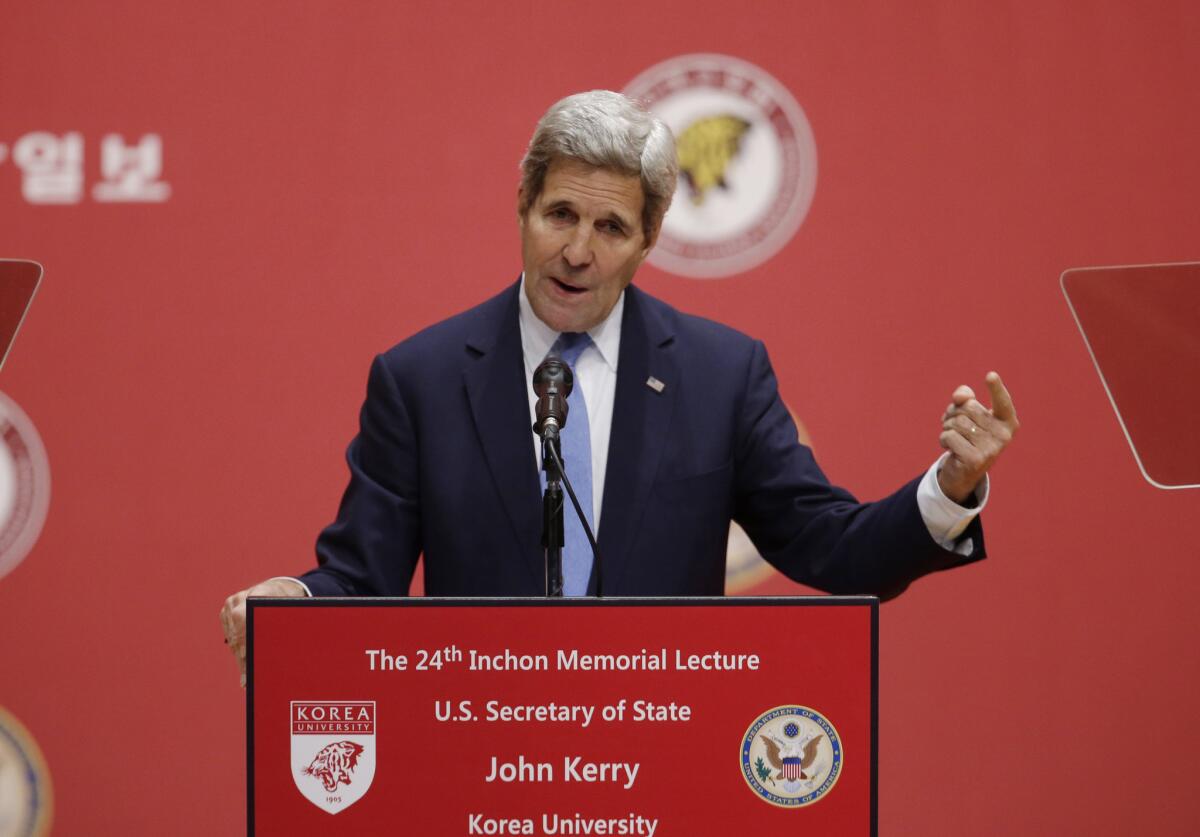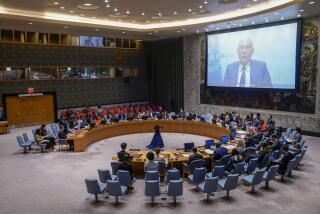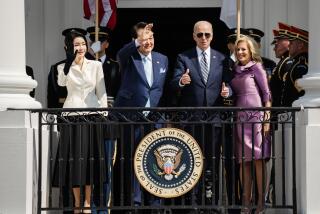Kerry denounces North Korea over cyberattacks, hack on Sony Pictures

U.S. Secretary of State John Kerry delivers a speech on cybersecurity and related issues at Korea University in Seoul on May 18.
Reporting from Seoul — In a speech on cybersecurity, U.S. Secretary of State John F. Kerry on Monday singled out North Korea as a violator of Internet freedom and took the reclusive country to task for November’s hacking attack on Sony Pictures.
Kerry called the attack on the Los Angeles movie studio one of North Korea’s “provocative, destabilizing and repressive actions” in a lecture at Korea University in the South Korean capital. Kerry noted that additional sanctions on North Korea that Washington implemented earlier this year were a response to the cyberattack on Sony Pictures.
Before calling out North Korea, Kerry expressed Washington’s commitment to a “free and open Internet worldwide.” In addressing the possibility of hacking attacks that come with an open cyberspace, Kerry said: “Those who may be tempted to cause trouble should be forewarned -- they will be held accountable for their actions.”
In January, President Obama signed an executive order sanctioning three North Korean organizations and 10 individuals for the November attack, which came just ahead of the release of “The Interview.” The comedy starring Seth Rogan and James Franco centers on a television journalist sent to North Korea to interview leader Kim Jong Un. The journalists are under CIA orders to assassinate Kim, and at the end of the film, the actor playing Kim is depicted having his head exploded by a shell.
The cyberattack last fall, which disrupted Sony Pictures’ IT system and exposed emails and information including employee salaries, led the studio to initially cancel theatrical release of “The Interview.” Sony later reversed course and went ahead with a limited theatrical and online release of the movie.
North Korea denied involvement in the attack, but praised it as a “righteous deed.” North Korea objects strongly to unfavorable depictions of its ruling dynasty, and before the hacking attack had criticized “The Interview,” calling the film an “act of war.”
On Monday, Kerry said that “no other government” is as “extreme” as North Korea in limiting its citizens’ access to the Internet, and he drew a sharp contrast with South Korea, which he praised as a world leader in Internet connectivity. Most North Koreans beyond a small, privileged elite have no Internet access.
Earlier on Monday, Kerry held a news conference with South Korean Foreign Minister Yun Byung-se, during which he condemned North Korean provocations as well as its nuclear program, and said that Washington and Seoul have consistent positions on how to respond.
“There is no daylight, not an inch, not a centimeter, not a microscope of difference between the United States and the Republic of Korea in our approach to the question of North Korea’s provocations and its nuclear program,” Kerry said, according to South Korea’s Yonhap News Agency.
Kerry’s visit comes less than two weeks after North Korea claimed to have conducted a successful launch of an underwater missile. Also, South Korean intelligence agencies told lawmakers last week that a top North Korean defense official had been executed with an antiaircraft gun for “treason” and for falling asleep during a meeting at which Kim Jong Un was presiding.
On the topic of North Korea’s recent acts, Yun said: “We took note of uncertainty over North Korea’s internal situations. We agreed to strengthen joint deterrence and coordination on the North Korea issue at a high level between South Korea and the U.S.,” according to Yonhap.
Kerry also held a meeting on Monday with South Korean President Park Geun-hye, who is scheduled to visit the U.S. next month. He arrived in South Korea on Sunday after a visit to China, and drew local attention on Monday for having lunch with U.S. Ambassador Mark Lippert at a popular Korean-Mexican fusion restaurant in Seoul.
Before starting the body of his Monday lecture, Kerry acknowledged Lippert, who was attacked by a knife-welding assailant at a lecture event in Seoul in March. Kerry commended Lippert for displaying “great grace and dignity under duress” and having “never wavered in his determination to do his job to the best of his ability.”
Lippert suffered serious wounds to his face and left arm in the attack, carried out by a South Korean man. Lippert returned to work two weeks after the attack and has maintained the active and open persona that had endeared him to many South Koreans before the attack, including throwing out the first pitch at a baseball game and taking a walk with Seoul Mayor Park Won-soon along one of the city’s ancient palace walls.
Borowiec is a special correspondent.
More to Read
Sign up for Essential California
The most important California stories and recommendations in your inbox every morning.
You may occasionally receive promotional content from the Los Angeles Times.










